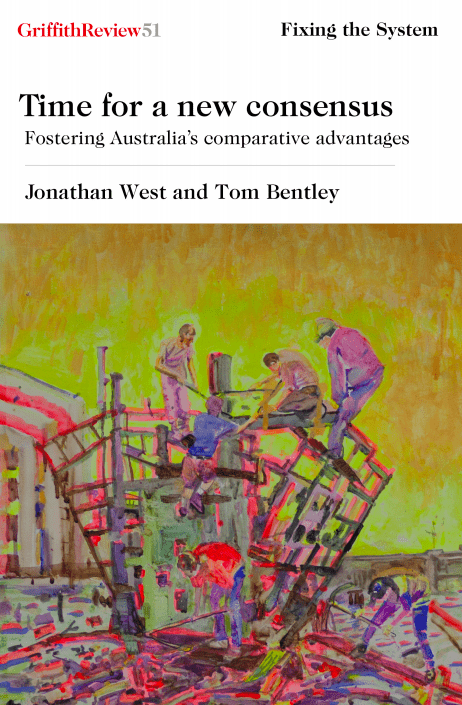We’ve got some great progressive reading suggestions to keep you busy over summer.
Our thanks to Research Fellows, staff, Research Committee Members and supporters for these suggestions.
 |
Time for a New Consensus Tom Bentley and Jonathan West (2016, Griffith Review 51) In an in-depth and insightful analysis of the Australian political and economic landscape, West and Per Capita Board Member Tom Bentley investigate the growing sense of stagnation in Australia’s approach to public policy and economic reform. They argue that the current sense of political inertia comes from the fact that the whole discussion is taking place within the parameters of a political consensus that was forged in the 1980s, and which has now passed its use-by date.DOWNLOAD THE EBOOK HERE |
 |
Secondhand Time: The Last of the Soviets Svetlana Alexievich (2016, Random House) Alexievich won the 2015 Nobel Prize for Literature for this and other oral histories, which document the tragedy of modern Russia. In this book, her interviewees describe what happened to them after the fall of the Soviet Union, when Russia and the other former Soviet Republics became failed states, governed by the mafia.Thanks to Dennis Glover for this suggestion |
 |
Our World in Charts: Understand the Economy and Money Stephen Koukoulas and Alan Kohler (2016, New South Books) A picture paints a thousand words, and in this book, jointly written by our own Research Fellow Stephen Koukoulas, more than 150 charts depict a range of economic, market and social issues. Charts give context. An annual budget deficit of $30 billion sounds a lot, but relative to the size of the economy in 2017 it’s about the average of the last 40 years. A chart can show this. |
 |
Why the Future is Workless Tim Dunlop (2016, New South Books) We all know the robots are coming, and the era of full-time work is coming to an end. This book says we need to stop holding onto the idea that jobs are just going to magically reappear, and understand that we have choices now. We need to think big and make changes now, not wait until we live in a world of mass unemployment.Thanks to Emma Dawson for this suggestion. |
 |
Music and Freedom Zoe Morrison (2016, Penguin Random House) This debut novel by Zoe Morrison tells the story of Alice, raised on an orange orchard in rural Australia. Her mother very early recognizes her talent, and Alice is sent to England to study piano and later receives a scholarship to the Royal College of Music in London. The story charts Alice’s lonely experience, and later her abusive marriage. When we meet Alice in later years, she reflects on the choices made for her. It is a story of how patriarchal norms can cut down young women, and also examines the notion of freedom offered by a creative life. |
 |
Hillbilly Elegy:A Memoir of a Family and Culture in Crisis JD Vance (2016, Harper) The author tells his own personal story of growing up in a poor rust belt town, and of the disintegration of that world and that culture. This is a process that’s been slowly occurring for over forty years. It’s a compassionate, discerning sociological analysis of the white underclass that has driven the rise of Trump. It’s an insight into the despair and estrangement of this group, why they see the system as rigged and why a figure like Trump is appealing. It gives a personal story to the politics of anger in the US.Thanks to Rod Glover for this suggestion |
 |
Talking to My Country Stan Grant (2016, Harper Collins) This is his very personal meditation on what it means to be Australian, what it means to be indigenous, and what racism really means in this country. It offers something to every Australian about our country – not just what it is, but what it could be. It is part memoir, part letter and party history lesson. |
 |
Fight Like a Girl Clementine Ford (2016, Allen & Unwin) Scourge of online trolls, Ford is never afraid to put forward an incendiary argument. This is a call to arms – it lays out the way girls and women are hurt and held back, and insists on our right to be angry, to be heard and to fight. Acknowledging that she’s a privileged white woman, she unpacks the structural oppression of patriarchy and capitalism, and ends with a reassurance that it’s OK to feel angry.Thanks to Allison Orr for this suggestion. |
 |
The Curious Story of Malcolm Turnbull and the Incredible Shrinking Man in the Top Hat Andrew P Street (2016, Allen & Unwin) We all know the story of our revolving door politics of the last few years, and this tells the same story, but does it with humour that highlights the ridiculousness of the actions and players. As a sequel to The Short and Excruciatingly Embarrassing Reign of Captain Abbott, it’s a fun summer read for those who like politics but need a break from the more serious analysis. |
 |
The Man on the Twenty Dollar Note Everald Compton (2016, Xlibris) This is the story of John Flynn – Flynn of the Inland, a man whose name is synonymous with the bush. Most famous for founding the Royal Flying Doctor Service, he also helped found the School of the Air, pioneered the pedal-powered radio and built numerous bush hospitals throughout the inland and remote Australia. |
 |
And one from the vault…
Economic Rationalism in Canberra: A Nation-Building State Changes its Mind Thanks to Warwick Smith for this suggestion. |

